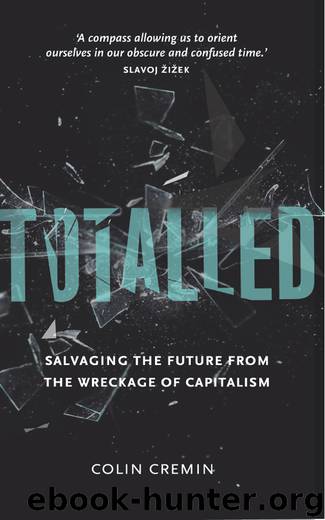Totalled by Colin Cremin

Author:Colin Cremin
Language: eng
Format: epub
Publisher: Pluto Press
A Crisis of Consumption
Here is a question: Does a crisis of consumption mean there is a crisis of subjectivity?
To recall, in the early part of the 1960s, Marcuse described what he called the ‘happy consciousness’: a person comforted by the availability of mass consumer goods, and satisfied with the system as it is and with their place in it. The pleasure principle, he said, is absorbed by the reality principle, though the outlook appeared to have changed by the early 1970s when he wrote, ‘The rising standard of living … enforced the constant creation of needs that could be satisfied on the market; it is now fostering transcending needs which cannot be satisfied without abolishing the capitalist mode of production’ (1970: 16). Marcuse speculated that the consumer would become capitalism’s gravedigger. What we now know is that in desperate times people are more likely to crave iProducts than organise for social revolution. In the 1960s expectations were on the rise and in more recent years they have been cultivated to fall. The superego law of diminishing expectations interpellates the subject to want more but expect less and disavow the shoddy consequences of material deprivation through wild fantasies and grandiose beliefs, a heady brew of apocalypse, narcissism and celebrity. A crisis of subjectivity can be delayed indefinitely as long as the real conditions of existence and their likely consequences are disavowed rather than confronted. As lifestyles to which people are accustomed become harder to maintain, dissatisfaction intensifies and in turn, the urge to overcome this dissatisfaction becomes irresistible, and we attempt to do so in the workplace and shopping mall in increasingly atomised ways.
As noted, the reproductive cost of labour relates to the amount of wages required to meet expectations and as a measure of what we are prepared to work for. For example, an immigrant without citizenship may contribute the same amount of value to the firm as a legal worker but, due to her status, she is prepared to do the job for a lot less money thereby producing more surplus value. The reproductive value of her labour, what it costs capital to employ her, is therefore lower and the surplus value higher. The immigrant gets what in market terms they are ‘worth’.
Tracking surveys of changes in the price of commonly purchased goods provide some indication of where our money goes, how far it stretches and how, in time, our expectations are altered to match new realities. The ‘shopping basket’ of goods for one class is of course very different to that of another. Were it not for the trivial cost of such fripperies, the superrich would likely feel a little anxious after reading Forbes Cost of Living Extremely Well Index and learning that the price of Russian Sable Fur coats is skyrocketing, although likely relieved to learn that a strengthening dollar has made dinner at La Tour d’Argent in Paris more affordable.4 Exchange value is not strictly correlative to price; a weak euro, for example, can mean that goods are cheaper in Paris than they would be at home for the sterling-carrying tourist.
Download
This site does not store any files on its server. We only index and link to content provided by other sites. Please contact the content providers to delete copyright contents if any and email us, we'll remove relevant links or contents immediately.
International Integration of the Brazilian Economy by Elias C. Grivoyannis(111059)
The Radium Girls by Kate Moore(12028)
Turbulence by E. J. Noyes(8049)
Nudge - Improving Decisions about Health, Wealth, and Happiness by Thaler Sunstein(7707)
The Black Swan by Nassim Nicholas Taleb(7129)
Rich Dad Poor Dad by Robert T. Kiyosaki(6632)
Pioneering Portfolio Management by David F. Swensen(6301)
Man-made Catastrophes and Risk Information Concealment by Dmitry Chernov & Didier Sornette(6019)
Zero to One by Peter Thiel(5802)
Secrecy World by Jake Bernstein(4753)
Millionaire: The Philanderer, Gambler, and Duelist Who Invented Modern Finance by Janet Gleeson(4478)
The Age of Surveillance Capitalism by Shoshana Zuboff(4292)
Skin in the Game by Nassim Nicholas Taleb(4248)
The Money Culture by Michael Lewis(4207)
Bullshit Jobs by David Graeber(4190)
Skin in the Game: Hidden Asymmetries in Daily Life by Nassim Nicholas Taleb(4007)
The Dhandho Investor by Mohnish Pabrai(3765)
The Wisdom of Finance by Mihir Desai(3747)
Blockchain Basics by Daniel Drescher(3583)
